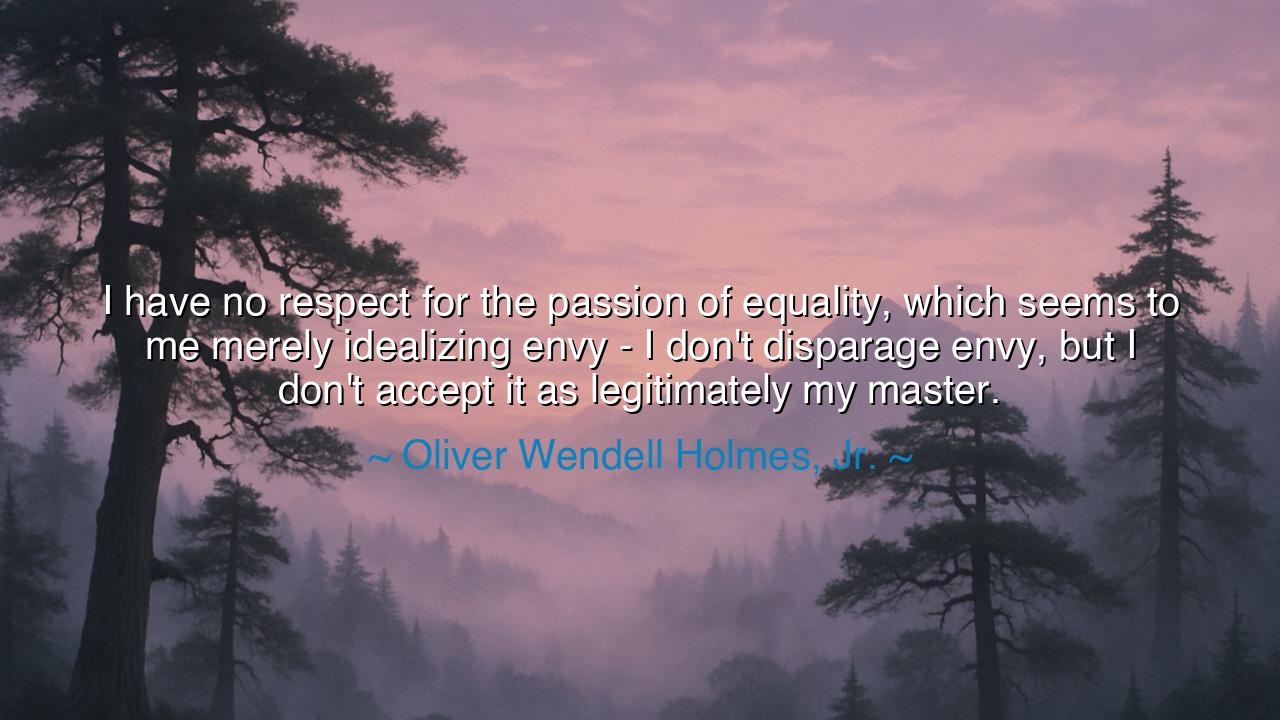
I have no respect for the passion of equality, which seems to me
I have no respect for the passion of equality, which seems to me merely idealizing envy - I don't disparage envy, but I don't accept it as legitimately my master.






“I have no respect for the passion of equality, which seems to me merely idealizing envy — I don’t disparage envy, but I don’t accept it as legitimately my master.” These words of Oliver Wendell Holmes, Jr., one of the most profound justices ever to sit upon the American Supreme Court, strike like tempered steel — sharp, deliberate, and enduring. They are not spoken in contempt of justice, nor as a defense of privilege, but as a warning about the darker passions that can masquerade as virtue. In these few lines, Holmes exposes the subtle danger that lurks beneath noble words — that even the cry for equality may become corrupted when it springs not from love of fairness, but from envy disguised as righteousness.
When Holmes speaks of the “passion of equality,” he does not condemn the idea that all men and women deserve dignity, opportunity, and freedom under the law. Rather, he cautions against the spirit that demands sameness not out of moral conviction, but out of resentment. He saw that many who claim to seek equality are not striving to lift the lowly, but to drag down the lofty — to destroy excellence in the name of fairness, and to mistake envy for justice. To him, this passion was dangerous, for it replaced the pursuit of virtue with the craving for possession. Holmes recognized that envy, though a natural human emotion, must never become one’s master; for once it rules, it blinds the soul to gratitude, honor, and the dignity of honest effort.
The origin of Holmes’s thought can be found in his life as both soldier and jurist. He fought in the American Civil War, where he saw men of all ranks and conditions — noble and humble — united not by envy, but by sacrifice. From those years of blood and fire, he learned that equality born of courage and merit is sacred, but equality born of resentment is poison. Later, as a Supreme Court Justice, he wrestled with the contradictions of democracy — how to protect the rights of all without stifling the excellence of the few. His statement was not born of cold intellect, but of lived experience: a soldier who had seen the cost of freedom, and a judge who understood that justice cannot be built upon envy’s foundations.
History offers many lessons that mirror Holmes’s insight. Consider the fate of the French Revolution, which began with a cry for liberty and equality but descended into terror and tyranny. What began as a noble pursuit of justice became consumed by jealousy and rage. The revolutionaries, in their fury, sought not only to overthrow kings but to erase all distinctions of rank, talent, and wealth. They mistook destruction for fairness. Holmes’s words might well have been written as a reflection on that age: equality, when governed by envy, devours the very society it seeks to redeem. True justice must aim not to make all men the same, but to give each man the freedom to become his best self.
And yet Holmes, in his wisdom, does not deny envy’s existence — he even says, “I don’t disparage envy.” This is the mark of his realism. He knew that envy is a part of human nature, a shadow that follows ambition. The desire to rise often begins by looking upward with longing. But to idealize envy — to crown it as a moral principle — is to invite chaos. When envy ceases to be acknowledged as a weakness and is instead sanctified as a right, society turns its gaze downward rather than upward. The poor resent the rich, the weak resent the strong, and no one aspires to greatness for fear of being hated for it. In this way, Holmes reminds us that true equality cannot come from resentment; it must come from self-respect and mutual respect.
His wisdom speaks to the heart of modern life as well. In an age where voices cry out for fairness, there is a danger that the pursuit of equality may lose sight of the virtue of excellence. The remedy to inequality is not envy, but empathy — not the leveling of all to the same height, but the lifting of all toward their highest potential. To envy another’s strength is to deny one’s own; to honor another’s greatness is to awaken it within ourselves. Holmes would urge us, therefore, to build a world where equality means opportunity, not uniformity; and where admiration, not resentment, fuels the progress of humanity.
So let this be the lesson drawn from Oliver Wendell Holmes Jr.: do not let envy dress itself in the robes of justice. Seek equality, but seek it with humility — not to bring others down, but to raise all hearts together. Respect ambition, cherish excellence, and remember that fairness without virtue is as hollow as freedom without discipline. Envy may whisper to the soul that others have stolen what should be yours, but wisdom replies that the only crown worth wearing is the one earned through courage, effort, and integrity. Let equality be guided by love, not jealousy; and let the measure of a just world be not that all stand on the same step, but that all are free to climb as high as their wings may carry them.






AAdministratorAdministrator
Welcome, honored guests. Please leave a comment, we will respond soon